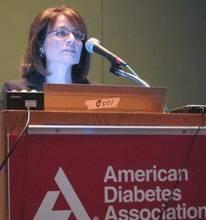CHICAGO – Regular insulin glargine use does not increase the risk of cancer, including pancreatic cancer, in patients with prediabetes or type 2 diabetes and high cardiovascular risk, according to a substudy of the prospective randomized ORIGIN trial.
The unadjusted rate of any cancer was 1.32 per 100 person-years in patients receiving insulin glargine (Lantus) or standard care. Cancer death rates per 100 person-years were similar, at 0.51 and 0.54, respectively.
"Daily exposure to glargine for a median of 6.2 years had a neutral effect on cancer events, including any cancers, new or recurrent cancers, cancer-related mortality, and various subtypes of cancer," Dr. Louise Bordeleau said at the annual scientific sessions of the American Diabetes Association.
Previous results from the pivotal ORIGIN (Outcome Reduction with Initial Glargine Intervention) trial, a double-blind, randomized trial with a 2-by-2 factorial design, showed no effect of insulin glargine on the primary endpoints of heart attack or stroke among the 12,537 patients (N. Engl. J. Med. 2012;367:319-28).
The new data are reassuring, particularly the absence of any spike in pancreatic cancer, session cochair Dr. Bessie Young, with the University of Washington in Seattle, said in an interview. Retrospective analyses of claims databases have linked insulin use to incidence cancers and metformin to reduced cancer risk. The ADA also recently called for an independent review of clinical data on incretin therapies used to lower glucose levels, because of safety concerns the drugs may increase the risk of pancreatic cancer and pancreatitis in type 2 diabetes.
In the current analysis, 82% patients had a prior diagnosis of diabetes, 35% were women, and the median insulin dose in those allocated to glargine insulin was 0.31 U/kg at 1 year and 0.40 U/kg at 6 years. Their mean age was 63.5 years.
In all, 953 patients (7.6%) were diagnosed with cancer, said Dr. Bordeleau, of the department of oncology at McMaster University, Hamilton, Ont.
Patients with new diabetes were more likely to develop cancer (8.5% vs. 5.9%; P = .0001). Metformin exposure and dose did not impact the risk of any cancer events or specific cancers, although both exposure and dose increased over the study period, she said. Metformin use was reported in 27.6% of those with cancer and 27.4% without, a nonsignificant difference.
Patients who experienced cancer versus those who did not were significantly more likely to be older (mean age, 66.1 vs. 63.3 years), current smokers (15% vs. 12%), or ex-smokers (54% vs. 46%); and were more likely to drink alcohol more than twice a week (30.2% vs. 22.1%) and have a prior cardiovascular event (64.3% vs. 58.4%).
In exploratory analyses, postrandomization hemoglobin A1c, glucose-lowering therapies, and weight had no effect on cancer risk, Dr. Bordeleau said.
ORIGIN was funded by Sanofi. Dr. Bordeleau reported having no financial disclosures.


